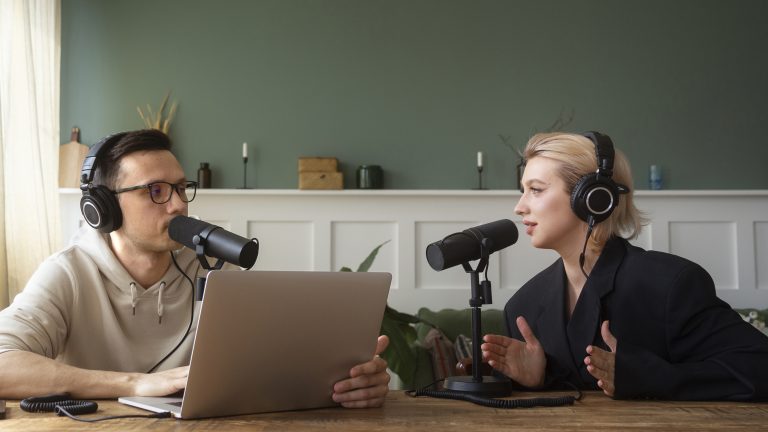How to start a podcast is a question asked by thousands of aspiring creators today. With podcasting becoming one of the most powerful mediums for storytelling, education, and entertainment, it is no wonder that more people are exploring it as a creative and professional pursuit. Whether you want to share knowledge, build a brand, or connect with an audience, podcasting opens endless opportunities when done with the right strategy.
Why Podcasting Has Become So Popular
Podcasting has seen a remarkable surge in popularity worldwide. Listeners appreciate the intimacy of the medium because it allows them to consume content while multitasking—whether driving, working out, or relaxing at home. For creators, podcasts require relatively low investment compared to video production, yet they offer the potential to build authority and establish deep audience engagement.
The evolution of digital platforms has made it easier than ever to learn how to start a podcast with minimal technical knowledge. This accessibility has democratized content creation and inspired individuals from different industries to launch their own shows.
Planning the Foundation of Your Podcast
Every great podcast begins with a strong concept. Before recording, you need to identify your niche. Ask yourself: Who is your target audience? What problem does your podcast solve for them? What unique perspective can you bring that differentiates you from the competition?
Think of it like designing a roadmap for your creative journey. For example, if you are passionate about travel, you could create a podcast that focuses on hidden cultural stories rather than mainstream tourist destinations. This kind of originality helps you stand out.
By focusing on clarity of vision, you can ensure that your audience not only tunes in but also keeps returning for future episodes.
Choosing the Right Equipment
For many beginners, the biggest concern when learning how to start a podcast is equipment. The good news is that you don’t need expensive tools to begin. A quality USB microphone, a pair of headphones, and a laptop with recording software are enough to produce clear audio.
As you grow, you can upgrade to advanced gear such as XLR microphones, mixers, and soundproofing panels. Your aim should always be to provide a comfortable listening experience, as poor audio quality is one of the main reasons listeners abandon new podcasts.
Crafting Engaging Content
Content is the soul of any podcast. Once you have the technical side sorted, it’s time to script or outline your episodes. Some podcasters prefer a conversational style, while others use scripted storytelling. Both approaches can work effectively depending on your theme and audience expectations.
A storytelling-driven podcast might open with a personal anecdote or a dramatic real-life scenario to hook listeners. On the other hand, an interview-based podcast benefits from strong research, thoughtful questions, and natural conversations. The ability to deliver consistent, engaging content will determine the long-term success of your podcast.
Recording and Editing Your Podcast
Recording requires a quiet environment, proper microphone setup, and basic software such as Audacity or GarageBand. Pay attention to voice clarity, background noise, and pacing.
Editing is equally important. Removing unnecessary pauses, adjusting volume levels, and adding intro or outro music gives your podcast a polished, professional feel. Editing is also your chance to shape the narrative flow, ensuring that your audience remains engaged from start to finish.
Hosting and Publishing Your Podcast
Once you have your first few episodes ready, the next step in how to start a podcast is choosing a hosting platform. Podcast hosting services store your audio files and distribute them to platforms like Spotify, Apple Podcasts, and Google Podcasts. Popular options include Podbean, Buzzsprout, and Anchor.
Your podcast’s metadata—such as title, description, and artwork—plays a huge role in attracting listeners. Ensure that your cover art is eye-catching and your show description is concise but informative. This is where search optimization can help you stand out in a crowded marketplace.
Growing and Marketing Your Podcast
Launching a podcast is only the beginning. To grow your audience, you need consistent promotion. Share new episodes on social media, collaborate with other podcasters, and invite guests who bring their own communities to your show.
Encourage listeners to leave reviews and ratings, as this boosts visibility on platforms. Many successful podcasters also create newsletters, websites, or YouTube versions of their shows to expand reach. The key is to build a community that feels personally connected to your content.
Monetization Opportunities in Podcasting
While your first goal should always be providing value to listeners, it’s worth exploring monetization once your podcast gains traction. Options include sponsorships, affiliate marketing, premium subscriptions, and merchandise.
Some creators also use podcasts as a funnel to promote their courses, books, or consulting services. With patience and consistency, podcasting can evolve from a creative hobby into a sustainable career.
Lessons from Successful Podcasters
When studying how to start a podcast, it’s valuable to observe those who have already succeeded. Popular podcasters often highlight the importance of authenticity, consistency, and listener engagement. They emphasize that building a podcast is a long-term journey, not a quick success story.
Listeners can tell when a host is genuinely passionate about the subject. That sincerity is what builds trust and keeps audiences coming back episode after episode.
Embracing the Journey of Podcasting
The beauty of podcasting lies in its accessibility and flexibility. Anyone with a story, knowledge, or experience can share it with the world. Your unique voice and perspective can reach people you’ve never met, creating connections that transcend geography.
Understanding how to start a podcast means embracing both the creative and technical aspects of this medium. From developing content to reaching audiences, every step teaches you something valuable about communication, storytelling, and community building.
Read also:
betterthisworld stocks
management tips aggr8budgeting
betterthiscosmos posts by betterthisworld
whatutalkingboutwillis gift
